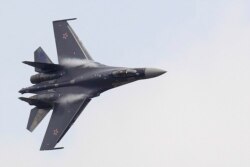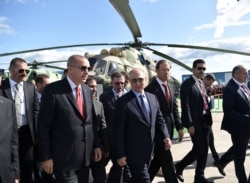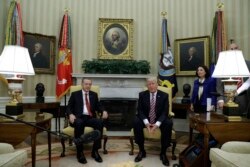Turkish President Recep Tayyip Erdogan is threatening to deepen military ties with Moscow unless the United States lifts its embargo on the sale of a key fighter jet.
The warning comes ahead of next week's planned meeting between Erdogan and President Donald Trump.
Turkey is set to purchase the Su-35, Russia's latest fighter bomber. The country is already provoking alarm among its western allies with its procurement of Russia's S-400 missile system.
"When we bought the S-400, we did not ask anyone [for permission]. So, if we make a decision, we will purchase them [Su-35]," Erdogan said Tuesday.
Erdogan indicates a final decision on the Russian jet purchase could be in the hands of Washington. He called for Trump to unfreeze the sale of America's F-35 fighter jet to Turkey.
The U.S. embargo was imposed in retaliation of Ankara procuring the S-400, which Washington claims compromises NATO weapons systems, particularly the F-35's stealth technology.
"If the F-35 issue is not resolved, we will take the necessary steps," Erdogan said.
Russian President Vladimir Putin hosted Erdogan at a Moscow air display in August where the Su-35 was on display.
In October, the Turkish Daily Sabah, which has close ties to the government, reported Ankara was close to buying 36 of the Russian fighter bombers.
The head of Russia's Federal Service for Military and Technical Cooperation, Dmitry Shugayev, confirmed last month that talks were underway for the delivery and possible co-production of both the Su-35 and the more advanced Su-57, which has not yet entered full production. Shugayev acknowledged that contracts have not been signed.
Turkey's increasing military purchases underscore Putin and Erdogan's developing relationship. But the purchase of the Su-35 is seen as taking Russian-Turkish ties to a new level, to the detriment of Ankara's NATO relationship.
"This is not a problem only between Turkey and the United States, but it's a problem between NATO and its 28 members," said retired Turkish Gen. Haldun Solmazturk.
"While still staying a NATO member within NATO's integrated command and control structure, and flying Russian aircraft, deploying Russian missile systems, does not make sense," said Solmazturk, who now heads Ankara-based think tank Turkey 21st Century Institute. "The world is not that simple."
Solmazturk points out that the purchase of Russian jets would mark a significant shift in military orientation toward Moscow, with the training and servicing of Su-35s conducted in Russian, along with regular visits of Turkish military personnel to Russia.
This week, Turkish Defense Minister Hulusi Akar vehemently denied any plans to purchase the Su-35. Akar, a former Turkish army chief of staff, is widely viewed as one of the most sympathetic Turkish ministers toward Washington.
Leverage against Washington
Erdogan's comments Tuesday appear to override Akar's denials. Analysts suggest Erdogan could be seeking to use the Russia jet purchase to his advantage in next week's expected meeting with Trump.
Trump invited Erdogan to Washington for a meeting on Nov. 13. Turkish officials said Wednesday that Erdogan had agreed to the meeting, and Trump said on Twitter the two leaders spoke by telephone and that he was looking forward to seeing Erdogan next week. Trump posted that the call included talk of Islamic State fighters, Turkey’s border with Syria and “ending of hostilities with the Kurds.”
Erdogan strongly condemned the vote last month in the U.S. Congress to recognize as genocide the mass killings of Armenians by Ottoman Turks during World War I.
Adding to Ankara's anger, Congress also is considering sanctions legislation against Turkey for last month's military operation against the YPG, the Syrian Kurdish militia.
Ankara designates the YPG as terrorists, but the militia was a crucial ally in the Washington-led war against Islamic State.
Some analysts suggest Erdogan's reluctance to meet with Trump is because the main agenda item is Turkey freezing its purchase of the S-400 and purchasing the U.S.'s Patriot missile system instead.
Erdogan reportedly wants a much broader agenda, including Syria, and pending congressional sanctions.
In a move that could strengthen Erdogan's bargaining hand in any Washington visit, Turkey's defense industry directorate announced Monday the postponement until next year of the delivery of the second batch of S-400s.
The delay is linked to Turkey's dispute with Moscow over technology-sharing and joint production of the missile system.
"Turkey is the cheese in the sandwich," said International relations professor Huseyin Bagci of Ankara's Middle East Technical University. "Both sides are squeezing Turkey. Turkey tries to manage both sides, but definitely Putin has more leverage on Turkey because of Syria."
In October, Putin and Erdogan struck an agreement to cooperate in Syria, ending Turkey's Syrian military operation against the Kurdish militia.
"Putin further peeled Turkey away from the West, the U.S. and NATO, turned himself into the sole playmaker in Syria [and] further advanced Russia's cause in the Mideast," said former senior Turkish diplomat Aydin Selcen.
The resumption of heavy airstrikes by Russian bombers on Syrian rebels in the Idlib province is seen as Putin possibly reminding Erdogan of Russia's importance. Ankara fears that a major offensive by Damascus against rebels in Idlib could trigger a significant exodus of refugees into neighboring Turkey.








